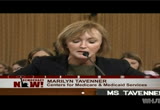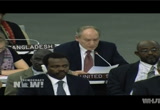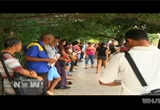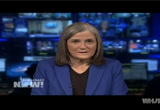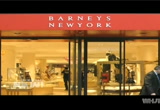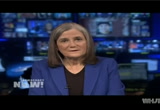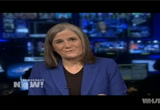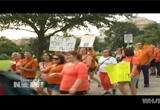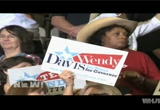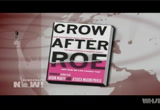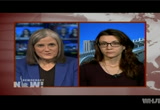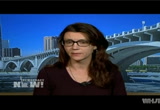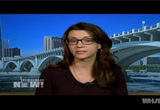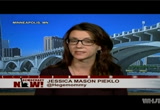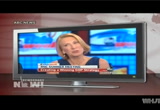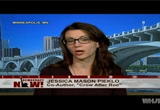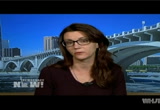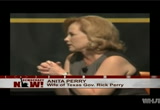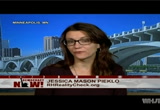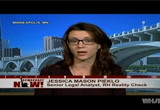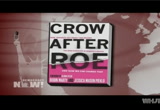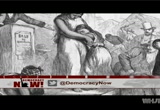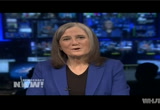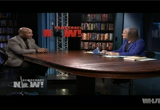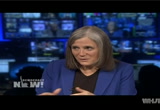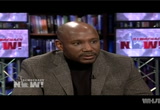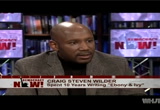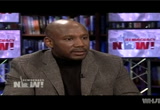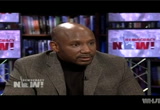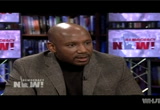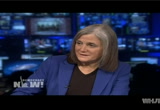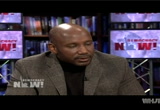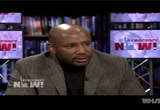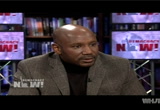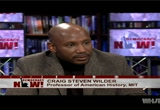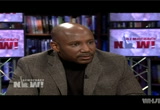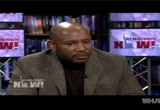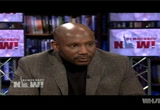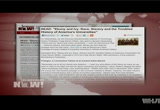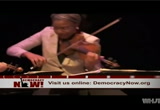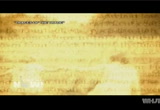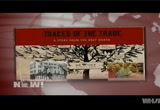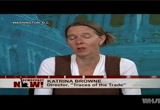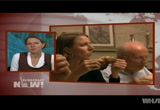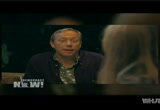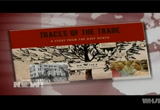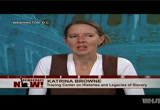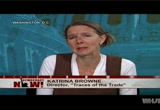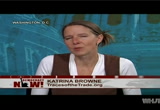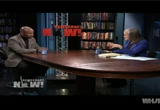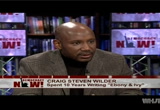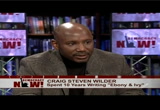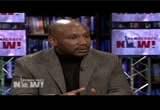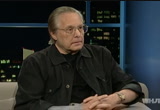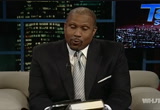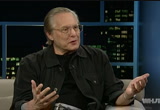tv Democracy Now WHUT October 30, 2013 6:00pm-7:00pm EDT
6:00 pm
have attempted use healthcare.gov to shop in general and health care coverage, i want to apologize to you that the website has not worked as well as it should. we know how desperately you need affordable coverage. i want to assure you healthcare.gov can and will be fixed, and we are working around-the-clock to deliver the shopping experience you deserve. we are seeing improvements each week. the experience on the site will be smooth for the vast majority of users by the end of november. >> she says the federal and state exchanges have received nearly 700,000 applications for health insurance. as she failed to say how many have actually enrolled, saying those figures will be available next month. wednesday, she also has republican complaints the new health care law is forcing the cancellation of many existing insurance plans. hundreds of thousands of people who have purchased their own insurance have reportedly begun receiving notices that their plans will be canceled or changed because they no longer
6:01 pm
meet the loss coverage requirements. 26 palestiniand prisoners as part of the agreement that reopened u.s.- backed peace talks earlier this year. it is the second wave of the releases that will ultimately free 104 of the thousands of palestinians in israeli prisons. as jubilant crowds greeted the freed prisoners in the west bank and gaza, israel announced today it plans to construct 1500 new homes in an east jerusalem settlement. the u.s. brokered israeli- palestinian negotiations are continuing behind closed doors. in a statement ahead of the prisoner's, the top palestinian negotiator yasser abed rabbo said israel's current stance in the talks is its most hardline in over 20 years. he said israel is seeking to hold onto major parts of the occupied west bank, "undermining the possibility of establishing ,"sovereign palestinian state
6:02 pm
he said. the united nations general simply has voted overwhelmingly to condemn the u.s. embargo against cuba for the 22nd year in a row. .he final vote was 188 to 2 just three countries abstained. u.s. envoy ronald gothard claimed cuba's record on human rights justifies the embargo. >> the international community can not be -- cannot in good conscience ignore the ease and frequency with which the cuban regime silence his critics, disrupts peaceful assembly, impedes independent journalism, and despite positive reforms, continues to prevent some cubans from leaving or returning to the island. government continues its tactics are politically motivated detentions, harassment, and police violence
6:03 pm
against cuban citizens. quick speaking for the cuban government, the cuban foreign thester parilla said embargo violates international law while hurting the cuban people. aggressivelyde is extraterritorial and a violation of international law. which lacerate the sovereignty of the states. it is a transgression of the international rules that governs foreign trade and freedom of navigation. the cruel inclusion of medicines and food is a violation of national humanitarian law. it is a hostile and unilateral act that should cease unilaterally. >> in his remark, parilla singled out president obama for tightening financial restrictions on cuba instead of listening the u.s. grip. cuba says the margo has cost over one $.1 stallion since president kennedy imposed in 1962.
6:04 pm
a pakistani family who survived a u.s. drone strike has appeared before congress in a historic hearing. on tuesday, he and his family told the story of the attack that killed his 68-year-old mother. nine-year-old nabila rehman described watching her grandmother blown to pieces. her brother, 13 years old, was injured with shrapnel wounds in the strike, said "my grandmother was nobody's enemy." it was the first time ever congress has heard directly from drone strike the him's. just five lawmakers, all democrats, chose to attend. we will bring you some of those who testified tomorrow on democracy now! following to dead multiple shootings on tuesday. in south carolina, six people were shot in what please call the murder-suicide involving the family. the victims included two children. in texas, shooting spree in a killed fiveell people. the alleged gunman was captured after a door-to-door manhunt.
6:05 pm
alabama has agreed to withdraw several provisions in its controversial immigration law from 2011. in a settlement was civil rights groups, alabama pledged to strike down measures in hb 56, including preventing courts from enforcing contracts involving undocumented immigrants and allowing public schools to determine the immigration status of enrolled students. a federal appeals court initially blocked enforcement of parts of the law, but not before thousands of latinos fled the state. in a statement, the southern poverty law center called the settlement is significant victory. york attorney general eric schneiderman has launched a probe of the retailers macy's and barneys following complaints from black customers of racial profiling. the storesr said employees alerted the police based on the racially biased suspicion they could not afford their expensive purchases. ews conference with the national action network in harlem, barneys ceo mark we deny the allegations.
6:06 pm
>> are pulmonary investigation has concluded that in both of these instances, no one from barneys new york raised any these purchases. no one from barneys brought them to the attention of our internal security, and no one from barneys reached out to external authorities. >> new york city tabloids have dubbed the episode "shop and frisk." of people marched in santa rosa, california on tuesday to protest the fatal police shooting of a 13-year-old boy. andy lopez was shot dead after police mistook the pellet gun he was caring for an assault rifle. police say the replica was missing the plastic orange piece usually placed on toy guns. in commemorations were held tuesday to mark the first anniversary of superstorm sandy which flooded the east coast and left 150 nine people dead. people lined up along the new
6:07 pm
jersey coastline holding flashlights to light up the sky. on staten island, hundreds of people gathered at a beachside park to mark the time the storm made landfall. city isoomberg said the being rebuilt to better handle future storms. >> if another storm ever approaches our shores, it will be a far different city than from the one saint he left behind. a city much more able to withstand the kind of surging seawater's and punishing winds that sandy brought. we are building new york city stronger and smarter so we will be resilient to a broad range of extreme weather events in the future, including big coastal storms. >> thousands of people remain homeless from sandy one year after the storm. you can go to democracynow.org for our full coverage on sandy's one-year anniversary from tuesday's broadcast as well as one year ago. and those are some of the headlines. this is democracy now!, democracynow.org, the war and peace report. i'm amy goodman.
6:08 pm
legaln to texas where a battle is being waged over the future of abortion access. on tuesday, texas attorney general greg abbott asked a federal appeals court judge to immediately reinstate a key part of the states new anti-choice law a day after it was ruled unconstitutional by lower court judge. on monday, district judge lee yeakel struck down a provision requiring onerous hospital admitting privileges for abortion doctors. the judge ruled the admitting privileges requirement -- texas governor rick perry has vowed to appeal the decision. monday's ruling came in response to a legal challenge for groups including the aclu and planned parenthood of greater texas. there look -- lawsuit did not challenge other controversial provisions of the law, a ban on abortion at 20 weeks was
6:09 pm
fertilization, which went into effect tuesday, and requirement that all abortion clinics be costly, hospital-style building standards by september 2014. the initial bill inspired a people's filibuster and a marathon stand from texas state senator wendy davis that thwarted state lawmakers first attempt to pass it over the summer. >> it is important in order for me to describe the impact of this particular bill them and that is what i am clearly talking about, the impact of this particular bill, i think it is perfectly reasonable to talk about it in the context of what women in texas today will face if this provision goes in place. >> state senator wendy davis is now running for texas governor after the 11 hour filibuster helped rocket her onto the national stage. in his ruling, and judge lee revisionheld another of the texas law which could
6:10 pm
have a major impact on the way abortions are delivered. the measure requires doctors to use a specific protocol for nonsurgical, pill-it is to origins. dr. say the protocol is outdated. the judge acknowledged the protocol is a surely more imposing and a pleasant angrily more burdensome to women. did he allow the provision mandating the protocol the stand. meanwhile, the oklahoma supreme court definitively ruled on tuesday that a similar restriction on medication abortion and that state is unconstitutional, saying it " restricts the long respected medical discretion of physicians." for more we go to minneapolis, minnesota where we are joined by jessica mason pieklo, senior legal analyst at rh reality check. she is co-author with rob and marty of the new book, "crow after roe: how 'separate but equal' has become the new standard in women's health and how we can change that." professor in law st. paul, minnesota. jessica mason pieklo, welcome back to democracy now!
6:11 pm
talk about the significance of the judge's ruling this week as the rest of the law in texas goes into effect. >> thank you for having me. the ruling is significant. it really sets the stage for the future battle of abortion access in texas, which is a battle over geographic access and clinic access. as you mentioned, the 20 week band that is included in this bill has not been challenged yet and that is in effect. the focus now is on how the texas legislature is attempting to restrict geographic access and with the medication born -- portion as well, the future in the state. >> explain what the medication abortion is about. what are the restrictions? >> the legislature enacted a requirement that physicians who
6:12 pm
administer medication abortions follow a specific protocol fda.oped by the at the standard of care is actually physicians using off label uses of various drugs, including one of the two drugs protocol. off label uses in medications all the time. that is how the medical practice developed. andthe texas restriction also like oklahoma and north dakota, for example, they require doctors to follow only the labeling protocol developed in 2000, which as the oklahoma supreme court ruled on tuesday, effectively bans the use of medication abortions across the board. so we will see that impact in texas. judge yeakel defended his
6:13 pm
decision by saying because the fda protocol is in place and is one alternative for doctors to use, there is not a ban. even though it may be burden some and difficult for patients who need the procedure and in some case cut off access earlier to some patients, that it is burdenn an acceptable for those patients to bear. >> and the oklahoma ruling? >> the supreme court essentially ruled the opposite, which was was one state law there constitutional because it took away positions in trading their patients, and placed -- tippie discretion away from physicians treating their patients. as a result, created a system of unnecessary burdens that became unconstitutional. the language in the oklahoma bill a slightly different, but both oklahoma and texas get to the same goal, which is trying to make medication abortion if
6:14 pm
not impossible to access, so difficult that women will give up. >> jessica, your article suggests this ruling in oklahoma set the new president. in texas. >> yes, well, so, this is a site going on across the country. he supreme court has indicated an interest in taking a look at the issue of whether or not states can effectively ban the use of medication abortion by the fdag doctors follow protocol or similar type of restriction. and so the oklahoma supreme court had ruled earlier in the year that the oklahoma law was unconstitutional. that ruling was petitioned to the roberts court and the indicated their interest in it, but sent it back down to the oklahoma court to answer a couple of questions of state law. that ruling came in yesterday. now it is a question of whether or not the u.s. supreme court wants to move forward in taking
6:15 pm
a look at that. >> i want to go to a clip of curly fear reena -- carly on abc news.ing she said texas antiabortion law is far from a particularly extreme position. >> that everyone in the republican party is pro-life. i happen to be pro-life, but there are many pro-choice republicans. when governor perry pushed forward legislation in texas to ban abortion after 20 weeks, he was labeled as an extreme move. that is five months. five months. there are only four countries in the world that legalize abortion after five months. china, north korea, canada, and the u.s. it is not an extreme position to say a woman needs to have a choice up to five months, and then there really has to be a medical reason. but it got cast as an extreme
6:16 pm
point. i would be willing to wager there are many, many single women who are pro-choice who say, you know what? five months sounds reasonable to me. i think part of the republican party's challenge is to not fall into the trap of having issues cast the way our political opponents want them cast, and be willing and courageous enough to have debate. >> she was a former california senate candidate. jessica mason pieklo, your response? >> well, you know, the extreme position i think is in an accurate one. what we're talking about here are bans that still exist reliability and prior to the time when a degree of prenatal testing can indicate fetal anomalies or other problems in premises that means the pregnancy is not compatible with life.
6:17 pm
the reasons we allow later term abortions to take place is because things happen in pregnancy. those events can be tragic for the pregnant person. we have decided the best option is to let that be a decision that happens between the pregnant person and their doctor . the supreme court has made this very clear, not only in roe v wade, but in the president that follows, that up to the point of fetal viability, there is this zone where the patient and the doctor should have the ability to make the decisions on their own. a 20 week band is still a pre- viability ban. to characterize a pre-viability ban as extreme is to mistake the nature of the law and the true intentions behind those bands. >> axis governor rick perry claimed his wife misspoke when she referred to abortion as a woman's right. this was at a public event last
6:18 pm
month. he said his wife used a wrong word in the wrong place. this is what the first lady of texas for many to perry, said. >> when women say, you understand this is an important issue and that women's rights are an important issue. your view is, the governor has a right? >> that is really difficult for me. i see it as a woman's right. if they want to do that, that is their decision. they have to live with that decision. >> i want to make sure you did not just in overtly make news. you think an abortion is a woman's right to make the choice? >> it is not mine. >> do believe the state is attempting to save for them and the governor and administration has its way - >> i think it goes back to the state and texas has decided, no, that is not what we want. >> but your personal point of view is it is a person's decision within the law? >> i don't think that is really making news.
6:19 pm
yeah, that is a woman's right. just like it's a man's right if he wants to have some kind of procedure. >> that is the first lady of texas, anita perry, her husband governor rick perry, said she misspoke, though it sounds like she was very clear about what she felt. jessica mason pieklo, she sounds a little like laura bush, president bush was opposed to abortion and laura bush had expressed her support for roe v wade. what is the significance of this? and give us the last national picture where abortion rights stand in this country. >> i think anita perry's statement is significant and i think the comparison to laura bush is apt as well. malewe see is we have lawmakers making decisions as to fundamental rights of women. also saidmrs. perry this is a matter that should be le up to the state, the
6:20 pm
reality is, when we are talking about fundamental rights, those are not something states vote on. abortion access and abortion rights is a fundamental right up to pre-viability on question. the supreme court has said that time and time again. said this is not a matter of law that should be intentionally clouded the way anti-'twas activists have. in terms of the national picture of where things happen now, we're in a battle state-by- state. we have several potential cases that are working their way up to the supreme court. one including a challenge to the ninth circuit ruling that struck arizona's 20 week ban. the attorneys just filed with the roberts court to have them take a look at that, to challenge directly be standard that viability is where we draw the line in terms of regulating state power, in terms of abortion access. medication
6:21 pm
abortion bans popping up across the country. and targeted regulations of abortion providers. architectural and other requirements designed to closed clinics or make it expensive for them to operate. what we're seeing nationally is a vice grip on clinics and abortion access, to the extent we have states that are held by conservative legislatures and governors, those restrictions have advanced rapidly like texas , arkansas, north carolina, mississippi. these are places where access was already under threat and now there is a window and they are taking that opportunity and off to the races with it. >> jessica mason pieklo, thank you for being with us. she co-authored the book, "crow after roe: how 'separate but equal' has become the new standard in women's health and how we can change that." professor of hamline university school of law in st. paul, minnesota. when we come back, "ebony & ivy: race, slavery and the troubled history of america's universities."
6:23 pm
quote
6:24 pm
some of the country's major
6:25 pm
in the middle of the
6:26 pm
actually only one college in the south, william and mary. there are a couple of other attempts, but they failed. the other eight colleges are all northern schools. in they're actually located key sites of the merchant economy where the slave traders had come to power and rose as this sort of financial and intellectual backers of the new culture of the colonies. >> talk about harvard. >> from its very beginning in 1636, the college by 1638 actually has an enslaved man living on campus who is referred to as the more. 2 is directly related to slave trades. i imagine how he gets to cambridge. one is right after the war in which the purists defeat the and dean's for southern -- the indians for southern connecticut, the captive are
6:27 pm
sold to the west. the ship returns with enslaved africans. it is right after that moment he appears on campus and becomes part of the sort of legend of early harvard. >> for the end of the book, you include a photograph that shows five men who served as president of harvard university from 1829 to 1862. talk about their significance in relation to slavery. >> what i wanted to show in the final chapter, the final bit, the ways in which slavery, even after the end of slavery in the northeast, even after the northern colonies and states moved toward emancipation and finished the process, they continued to have economic ties to the south and west indies. so one of the ways you can trace that is just by looking at who became the president of these universities. in the presidents were virtually always the sons or sons-in-law
6:28 pm
of merchant traders, people who are west india suppliers. so after the slave trade ins and slavery ends in the northern states, one of the businesses that continues is supplying the south and west indies with the provisions they needed to run the plantations. everett, have quincy, sparks? >> yes. example, mather. there is a house named after him. >> they go back a long way. matter of the second-generation as president of harvard and uses his slave, which was a person given to him by his parish, uses his slave to actually run the business of the college and the colonial period. .he slaves run errands
6:29 pm
he writes in his diary he sent his negro to do various bits of work for the college. everetthink about it, and sparks, one way they were able to achieve their congressman's, sparks, for instance, becomes famous about his writings of early american history. he became quite a polished historian, but that was also way of creating ties, intellectual relationships. so his writings as a historian also allows him to create intellectual connections to these very important regions, regions that remains important in the finance and her education long after slavery ends in the northeast. >> what about yell university? >> it is a similar story. when the original founders are meeting to establish what was asn the collegiate school,
6:30 pm
one of their chroniclers puts it, they come from various towns to meet up and there followed either man servants or slaves. the enslaved paper at the founding of the institution. once it is established, like most of the 18th-century colleges, especially by the 18th century as the slave trade peaks, the new vistas of higher education, the financial model for successful college, requires tapping into these new sources of wealth. that means the slave trade in the plantations in the south. >> did anyone at these universities say no to slaves? >> yes. yes. at every moment is a push towards slavery, there is also anti-slavery. there's an anti-slavery actually,emerging, from the 17th century through the 18th century. and much of it because of an intellectual movement, a moral and religious movement, is actually house on campus.
6:31 pm
so you have this tension on campus. i try to point that out at various times in the book. one of the examples i use relates to the image that you showed of the presidents, in particular, quincy. under quincy's administration, a german professor at harvard who germany and was kicked out for his radicalism, comes to the u.s. and gets appointed professor of german at harvard, then is immediately attracted to the abolitionist made meant. he is punished for that decision. he eventually loses his professorship. you trace the origins and the funding have largely come from families that were tied to slavery. >> that is interesting. a lot of the endowments for the professor chairs comes from the slave trade. >> the very first endowed , comesorship at yale
6:32 pm
from the livingston family of new york, new jersey, and it is the second-generation of livingston and gives it basically recognition of the fine education his sons had received at yale. largerton is one of the slave trading families out of new york city. the rivals for places like newport, rhode island and providence which dominates the north american trade, certainly the philadelphians and new yorkers were trying to catch up. >> we're going to talk about the dual family, the largest slave trading family in a moment and es joined by one of the dewolf and how she traced the trade and her family. but i want ask about princeton. >> kristen to me as one of the more interesting of the schools. founded in 1776 -- founded in evangelical tradition, princeton
6:33 pm
finds itself struggling through the years. in 1768, it had a sequence of short presidencies, including two deaths of the presidents. they recruit the scottish minister john weatherspoon. .e is acting to recruit one of the things are given the book is that what would make this successful minister attracted to relatively unsuccessful college in a colony that is not in fact a powerhouse in north america. the answer is the extraordinary network, scottish network in the americas, the ways in which the witherspoon family in particular had reached out across the americas and branched out across the americas and provided
6:34 pm
witherspoon array of securing -- a way of securing by exploiting these national connections in the americas, and included, are particular, scots were moving to the carolinas and virginia is and to the backcountry of virginia and into the caribbean. >> what did that have to do a slavery? >> he ends up pointing and looking south for new sources of students and money. as soon as he arrives. shortly after he arrives, he he promises the planters the british west indies the her sons would be better off in princeton, new jersey, which is intimate and where the faculty take very good care of the boys. rather than sending them to england, where young men from the west indies were known to be wealthy and get preyed upon by people with loose morals and broad ambition. so sending them to princeton actually would be better for
6:35 pm
them, but it was also be better for princeton. he is not the only one to do this. if you look at those colleges that are founded in the mid-18th century, they all send ambassadors to the west indies. >> tell us about betsey stockton who was enslaved by an early 19th-century president of princeton. -- was given to the wife as a gift when she was a younger woman. enter marriage comes into the household -- and through marriage comes into the ofsehold of the president princeton. he eventually emancipate sir. establishes a ministry with many of the people in the black community surrounding winston. he e-mails up a her. emancipates her.
6:36 pm
she becomes quite good a biblical geography. >> spending most of her time in his library. >> and known for her biblical geographic skills. she eventually becomes a schoolteacher in new york. mission inff to a hawaii where her skills with language and religion become critical to the success of the mission. you have this person who is born enslaved and lives as enslaved person on a college campus, then leave this extraordinary life afterward. >> you also talk about race science, the search for cadavers for scientific research at these universities. >> one of the things i wanted to do with the book was to try and explain how slavery and the slave trade provided the of higher education in north america.
6:37 pm
but i also wanted to explain the role that colleges played in perpetuating slavery in the slave trade, and that is where you get to the race science. that is where becomes critical. it is precisely on campus the ideas that come to defend slavery in the 19th century get refined. intellectualr legitimacy on campus. they get their scientific veneer on campus. they get their moral credentialing on campus. i wanted to trace that process. one of the ugliest aspects of that is the use of marginalized people in the americas, in the u.s., enslaved black people, often native americans, and sometimes the irish. they are expended -- there are experiments. turn to section and anatomy into the new medical arts. .ut that requires aunties in the british islands, that
6:38 pm
means you're often exploiting ireland. in north america, it means you're often taking advantage of people who have no legal or moral protection on their bodies . >> can you give an example? >> at dartmouth, the medical college -- it would be unfair to say the medical college because of this moment, but the teaching of science in hannover begins when the physician to the president drags the body of enslaved black man, whose deceased named cato come to the back of his house and boils up body in an enormous pot to free up the skeleton, to wire it for instruction. that act is not an usual. in fact, when one of the first medical colleges was established in north america, the first was the college of philadelphia, and
6:39 pm
the second is at kings college, which is now columbia, when those institutions were founded, there founded in part -- part of what allows them to be established is access to corpses, to have people to experiment upon. the enslaved and marginalized to our volunteered for that. >> craig wilder, we want you to stay with us. we're going to trace one family's roots, and i would like you to comment on how it links to the universities of this country. craig wilder is the author of, "ebony & ivy: race, slavery and the troubled history of america's universities." to our website to read the books prologue at democracynow.org professor wilder teaches american history at m.i.t. and also taught at williams college as well as dartmouth. stay with us. ♪ [music break]
6:41 pm
>> this is democracy now!, democracynow.org, the war and peace report. i'm amy goodman. we continue our conversation on slavery come and join by a woman who uncovered that her ancestors were the largest slave trading family in u.s. history. is with us.ne she documented her roots in the film, "traces of the trade: a story from the deep north." >> one day my grandmother traced those in seminary when i got a booklet in the mail that she wrote for all her grandchildren. she shared our family history. all the happy days. she also explained the first inolf, came as a sailor 1744. i haven'trote,
6:42 pm
stomach enough to describe the ensuing slave trade. what hit me hard was the realization that i already knew this. knew, but somehow buried it along the way. what no one in my family realized was that the dewolfs were the largest slave trading family in u.s. history. they brought over 10,000 africans to the americas in chains. half a million of their descendents could be alive today. >> a clip from "traces of the trade: a story from the deep north." narrated, produced, and directed by katrina browne. after it aired in 2008, she went down to found the tracing center to inspire dialogue and active
6:43 pm
response to this history. katrina browne joins us from washington, d.c. and still with us, m.i.t. professor craig wilder, author of the new book i'm a "ebony & ivy: race, slavery and the troubled history of america's universities." katrina, take us from there. you discover, though you say you knew, some kind of primal secret, what your family, how significant the dewolfs were enslaved trading -- in slave trading. >> in our family case, it is a bit of a stand-in for the region of a whole because i heard things as a child but i didn't allow them to sink in because it is basically cognitive for white northerners to say we don't have any relation to slavery, because i think we are all raised and educated in our schools to believe the south were the bad guys in the north were the heroes. it was hard to comprehend and
6:44 pm
shocking to discover as i dug more into it. and because of this larger, untold story of the north's role, i decided to produce a documentary. a sickly i invited relatives to join me on a journey to retrace the triangle trade -- a sickly, i invited relatives to join me on a journey to retrace the tranquil trade. nine brave cousins came with me. even after slavery was abolished continuedthe dewolfs to be invested in slavery through actual plantations in the caribbean and cuba as well as through the caring trade of provisioning the islands and the american south. >> i want to go to another clip of the film. you and your relatives go to ghana. you just visited the dark, dank
6:45 pm
rooms where the africans were kept until they were sold and loaded onto ships. this is your relative, tom dewolf, describing his reaction. >> a thing that i get strikes me more than anything right now is we talked when we were in bristol and we were in providence and were listening to historians and scholars and we have heard people talk about, you got a place it in the context of the times and this is the way things were done and this is how life was. and i sit in that dungeon and i it is an evil thing and they knew it was an evil thing and they did it anyway. i could not have said that before tonight. >> let's go to another clip from "traces of the trade," were you in a relatives visit bristol rhode island. in the scene, you're visiting with local historians.
6:46 pm
>> the more historians we talk to, the more sobering it got. >> it is not just a few people [indiscernible] everyone in town lives off slavery. literally, the whole town was dependent on the slave trade. >> all of the north was involved. all of these cities along the coast. salem, new haven, new york, boston, and the rural areas around them either traded slaves or manufactured goods or raised farm products for the slave trade. >> that was historian joann pope melish. katrina browne, some of your family members went on this
6:47 pm
journey. you are also shunned by others. where has this taken you? i mean, this is not commissioned point out, just any family involved with slavery, although, that is unbelievable to say in itself, your family is the largest slave trading family in the united states and it is in the north. it would shocker listeners to hear there was a great deal of anxiety and discomfort and nervousness about publicizing i thinkly history, and one thing that i've have come to appreciate is the depth of the emotions they get in the way for white americans, not just our family. we are an extreme case, but i think it is an example of a larger pattern which is defensiveness, i fear, guilt, shame, those emotions get in our way both from really confronting history and appreciating the
6:48 pm
the sort of-- tentacles of slavery and how fundamental it was to the birth and success of our nation, and for the wavesway of immigrants that came subsequently. aroundiously, discomfort grappling with the implications for today and really coming to grips with that. i hear so many black americans say, were not kind to guilt trip you, quit taking it so personally. we just want you white folks to show up for the work -- to work together with us for repairing those harms that continue to plague this country. i notice how i have gone from extreme major guilt reaction upon learning about my family and region to a more grounded, and i would say mature and taker ability to
6:49 pm
stock. we are in extreme case, again, but it provides a view into what i think all white americans need to look at the legacy of white religion whatnot. >> katrina, what is your dewolf 's family to brown? , of course,sity based in rhode island. i know one of the dewolfs wrote of brown.ater so it amorwne with an e, is a different brown. john brown was a slave trader and they both ended up in congress and work together to preserve the slave trade, to help protect the rhode island --ve trade and all kind of
6:50 pm
in cahoots even with president thomas jefferson around some of that. in any case, the economy of rhode island was steeped in the slave trade. it usually shocks people to hear that rhode island was the leading slave trading state in the country, not south carolina were virginia. --or virginia. that leads to the founding of the university and some of the early funds for brown university. >> it is interesting that ruth simmons, the farrar president of brown, -- the former president of brown, wrist african-american president of any ivy league university, and i want to bring greg wilder back into this conversation, commissioned the first ivy league study of brown university's connection to slavery, professor wilder. >> i think this is a critical moment in american history.
6:51 pm
throughout the process of talking about the book, one thing that i constantly return to is her decision in 2003 to commission a study of brown's the slave trade. this happened for a number of reasons. there was a blowup at yale about their relationship to the slave trade, which became quite controversial. that also helped spark rumors about other institutions. and made public secret of brown's relationship became even more pronounced. when the first nonwhite president of an ivy league institution took office. it took tremendous courage to make that decision. the report in 2006 is an important extort -- extreme example of how we get this conversation happening. the same about the documentary.
6:52 pm
one thing that i think is fascinating about president simmons decision, the subsequent report and the public reaction to it, is that much of the hostility and fear the people the problemsed -- they had anticipated when the report and commission were first announced -- actually did not materialize. if you look at the recent history of the way in which we have engaged with the question of slavery in america's past, the brown report, documentaries trade," the of the exhibit on slavery in new york i'm a the anniversary at the end of the slave trade in new england, one thing i found fascinating is it provides extraordinary evidence the public is ready for difficult conversation that in many ways we tend to underestimate the capacity of people to really deal with -- and their desire -- to deal with these problems. her cousin in the documentary
6:53 pm
was saying, reacting to the slave trading and the material culture of the slave trade that is surrounding him. one thing i would like to remember or remind people is that, the things that white americans find difficult in horrific that generate feelings of guilt and fear, are also actually troubling in horrific and difficult for black americans. in that very fact, there's the possibility of a real genuine and useful conversation about slavery in american society. i think we're moving toward that. we are building their slowly, but we're getting there. i think the public is ahead of the rest of us at times. i think the media's more conservative and afraid in the public car. >> thank you for being with us, craig wilder, his new book,
6:54 pm
"ebony & ivy: race, slavery and the troubled history of america's universities." he is professor of american history at m.i.t. i want to thank katrina browne, producer and director of, "traces of the trade: a story from the deep north." democracy now! is looking for feedback from people who appreciate the closed captioning. e-mail your comments to outreach@democracynow.org or mail them to democracy no tavis: good evening.
6:55 pm
from los angeles, i am tavis smiley. tonight a conversation with william friedkin. includinge movies "the french connection" and "the quote a new e dish and will be released in connection with the 40th anniversary. edition will be released in connection with the 40th anniversary. we are glad you joined us for an interview with william friedkin,
6:56 pm
coming up now. ♪ >> and by contributions to your pbs station from viewers like you. thank you. -- tavis: director, producer, and screenwriter william friedkin is the iconic force behind so many iconic films, including "the french connection" and the movie it many consider to be the scariest film ever made, "the
6:57 pm
exorcist." that was released in 1973, which means it is 40 years old. with is a new edition commentary from friedkin. here is a scene from "the exorcist." >> is it coming out? >> yes, i think so. mother, mother! mother! stop!t tavis: as soon as that clip again to lay, i heard you whisper, i remember that scene. what do you remember from that scene? everything.r
6:58 pm
i worked on that film from beginning to end for four years. foreign versions as well. i supervised the dubbing and worked on subtitles in places like japan. there was a lot of give-and-take on translations. in japan the worst and you can , so aomebody is a fool lot of the four letter words had to go. the film was laced with them, i don't have to hesitate to say. we worked on the script even -- thehe model had been novel had been out for a year. we worked on the screenplay for another year. tavis: mr. friedkin -- >> call me bill. tavis: i will do my best, mr.
6:59 pm
friedkin. you said you did not set out to make a scary film. more spiritual journey, and i wonder if you might unpack . everybody sees it as the scariest film ever made, but that wasn't your intent. >> i understand that. i don't tell people they are crazy if they think that. they see it as a horror film, but it was based on an actual case. it was i inspired by a case that took lace in maryland. there were only three such cases in the 20th century and the catholic church that they authenticated as demonic possession, and they let an exorcism be performed. everything i have read, including
143 Views
IN COLLECTIONS
WHUT (Howard University Television) Television Archive
Television Archive  Open Access
Open Access  Television Archive News Search Service
Television Archive News Search Service 
Uploaded by TV Archive on

 Live Music Archive
Live Music Archive Librivox Free Audio
Librivox Free Audio Metropolitan Museum
Metropolitan Museum Cleveland Museum of Art
Cleveland Museum of Art Internet Arcade
Internet Arcade Console Living Room
Console Living Room Books to Borrow
Books to Borrow Open Library
Open Library TV News
TV News Understanding 9/11
Understanding 9/11